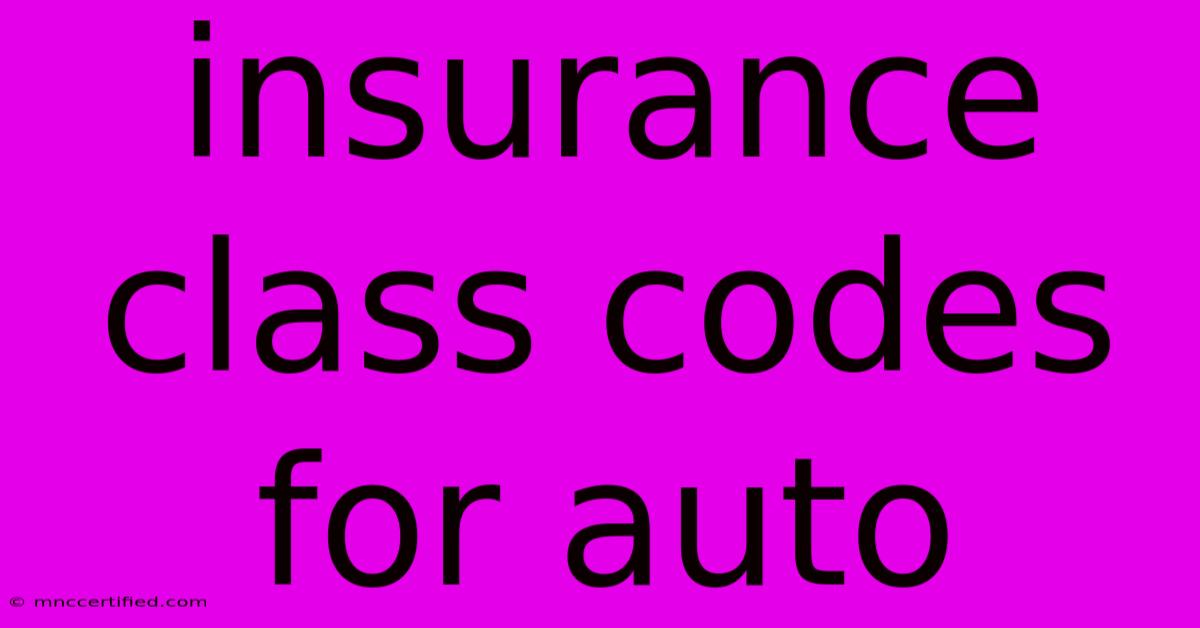Insurance Class Codes For Auto

Table of Contents
Decoding the Mystery: Understanding Insurance Class Codes for Auto
Choosing the right auto insurance policy can feel like navigating a maze. One of the key, yet often misunderstood, elements is the insurance class code. These seemingly cryptic numbers significantly impact your insurance premium, so understanding them is crucial to getting the best possible rate. This comprehensive guide will demystify auto insurance class codes, explaining what they are, how they work, and how they affect your car insurance costs.
What are Auto Insurance Class Codes?
Insurance class codes are numerical identifiers assigned to vehicles by insurance companies. These codes categorize vehicles based on various factors influencing risk, ultimately determining the premium you pay. Think of them as a shorthand way for insurers to assess the likelihood of your car being involved in an accident or requiring repairs. Instead of manually evaluating every single car, insurers use these codes to streamline the process.
Factors Influencing Class Codes:
Several factors contribute to a vehicle's assigned class code. These include:
- Vehicle Year and Make: Older cars, statistically, are more likely to be involved in accidents or experience mechanical failures. The make and model also play a role, reflecting historical claims data for specific car types.
- Vehicle Type: The type of vehicle significantly influences risk. Sports cars, for instance, typically fall into higher risk classes compared to sedans or minivans due to their higher performance capabilities and associated accident rates.
- Safety Features: Modern vehicles often boast advanced safety technologies like anti-lock brakes (ABS), electronic stability control (ESC), and airbags. These features can result in lower class codes and premiums.
- Engine Size and Horsepower: Powerful engines can increase the risk of accidents and higher repair costs, influencing the assigned class code.
- Vehicle Use: How you use your vehicle—for commuting, pleasure driving, or business—affects your class code. High-mileage business use usually leads to a higher risk assessment.
How Class Codes Affect Your Premiums
Higher class codes translate to higher insurance premiums. This is because insurers consider vehicles with higher codes statistically more likely to be involved in accidents or require expensive repairs. Conversely, a lower class code usually indicates a lower risk profile, leading to lower premiums. It's important to remember that your personal driving record and other factors also heavily influence your overall insurance cost.
Finding Your Vehicle's Class Code
Unfortunately, there's no single, publicly accessible database listing every vehicle's class code. The best way to find your vehicle's class code is to contact your insurance provider directly. They have access to the internal databases used for rating and can provide this information quickly. Your insurance application or policy documents might also contain this information.
Optimizing Your Insurance Costs
While you can't directly control your vehicle's class code, you can still influence your overall insurance premiums:
- Choose a safer vehicle: Consider safety ratings and features when purchasing a new or used car.
- Maintain a good driving record: Safe driving habits reduce your risk profile and can significantly lower your premiums.
- Bundle your insurance: Bundling your auto and home insurance with the same provider often leads to discounts.
- Shop around for insurance: Compare quotes from different insurance providers to find the best rates for your specific situation.
- Increase your deductible: While this increases your out-of-pocket expenses in case of an accident, a higher deductible can lower your premiums.
Conclusion: Understanding is Key
Auto insurance class codes are a significant factor in determining your premiums. By understanding how they work and the factors influencing them, you can make informed decisions to potentially lower your insurance costs. Remember to contact your insurance provider for specific information about your vehicle and always shop around to find the best coverage at the most competitive price. Don't let the mystery of class codes leave you paying more than you need to!

Thank you for visiting our website wich cover about Insurance Class Codes For Auto. We hope the information provided has been useful to you. Feel free to contact us if you have any questions or need further assistance. See you next time and dont miss to bookmark.
Featured Posts
-
Adcock Adcock Insurance Agency
Nov 27, 2024
-
Vanderpump Rules Renewed With Full Cast
Nov 27, 2024
-
Feyenoord 3 3 Man City Espn Match Breakdown
Nov 27, 2024
-
Kimpembe Psgs Bayern Boost
Nov 27, 2024
-
Commercial Snow Plow Insurance
Nov 27, 2024